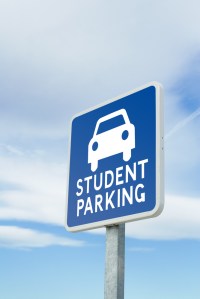
If you have a child headed off to college this fall, you may be debating the car issue – does the car go or does it stay?
There is no “right” answer to this question. Every situation for every student is different and the quandary doesn’t just apply to freshmen, although it seems to be a more-talked-about topic for first-year students.
 A good place to start is by checking out the college or university’s policy on student vehicles.
A good place to start is by checking out the college or university’s policy on student vehicles.
Some schools don’t allow student vehicles on campus. Georgetown University and the University of Wisconsin – Madison are two such schools. If your child is attending either, will live on campus and wishes to take a vehicle, plan on finding a place somewhere off-campus to keep that vehicle.
Many schools don’t allow freshmen to have vehicles on campus. Campus parking is usually at a premium. Restricting on-campus vehicles to upper-classmen can help alleviate some of those parking woes. In addition to parking limitations, staying on campus encourages first-year students to get the full college experience. Students who live off-campus or tend to spend much of their free time off-campus (e.g. those who choose to go home every weekend) don’t typically establish strong ties to peer groups like those who remain on campus. Attending campus activities and finding “study buddies” can make a significant difference in how students perform in school.

As mentioned earlier, on-campus student parking is typically at a premium. If you do plan to let your child take a vehicle to school, student parking is something you will want to check into before arriving. Are there assigned lots for dorms? Or are there assigned lots by year? Many colleges who do allow first-year students to bring a vehicle also have assigned freshmen parking.
Is there a parking sticker or pass that you need to purchase? If so, how much are they and are there assigned lots, depending on the sticker? Where are those lots in relation to your child’s dorm? Is there street parking?
Another consideration is cost. A college education already carries a hefty price tag. Besides the added expense of parking, here are some other items to consider:
- Will the absence of a family vehicle necessitate purchasing another vehicle?
- Does your current insurance policy provide adequate coverage? If not, how much will it cost to increase your policy?
- AAA estimates an average, small sedan will have approximately $5,000 in expenses (depreciation, gas, maintenance, etc.) during a nine-month academic year.
Add in parking expenses, the inevitable parking ticket or two and costs associated with potential breakdowns and you may discover the number one reason for keeping the vehicle at home.